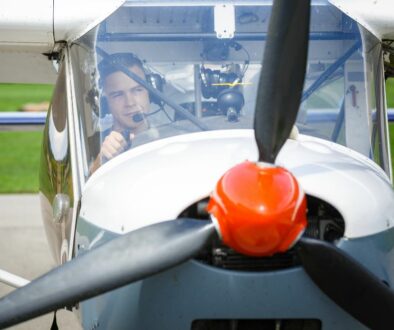How To Become A Commercial Pilot?
If you have always dreamed of flying a plane for a living, becoming a commercial pilot may be the perfect career for you. However, many aspiring pilots are uncertain about what it takes to become a commercial pilot. In this article, we will explore the steps to becoming a commercial pilot, the skills you need to develop, what the job entails, and the benefits of working in this field.
Steps To Becoming A Commercial Pilot
Becoming a commercial pilot is a dream for many. Not only does it offer a lucrative career, but it also provides the opportunity to travel the world. However, the journey to becoming a commercial pilot is not an easy one. It requires hard work, dedication, and a passion for flying.
- Obtain Private Pilot Certificate
The first step to becoming a commercial pilot is to obtain a private pilot certificate. This certification allows you to fly for personal reasons. You will need to undergo flight training and pass a written and practical exam to obtain this certification.
- Get Instrument Rating
Once you have obtained your private pilot certificate, the next step is to get your instrument rating. This rating allows you to fly in inclement weather and in low visibility conditions. It is a crucial step for any pilot who wants to fly commercially.
- Obtain Commercial Pilot Certificate
The third step is to obtain a commercial pilot certificate. This certification requires at least 250 hours of flight experience. You will need to pass both a written and practical exam to get the certificate. Once you have obtained this certification, you can start building your flight experience.
- Gain Experience
Most airlines require at least 1,500 hours of flight time, so you will need to build your experience by working as a flight instructor or flying charter planes. This can take several years, but it is an essential step in becoming a commercial pilot.
- Obtain Airline Transport Pilot (ATP) Certificate
The final step is to obtain an Airline Transport Pilot (ATP) certificate. This certification is required for pilots who want to fly for airlines. You will need at least 1,500 hours of flight experience to obtain this certification. Once you have obtained your ATP certificate, you can start applying for jobs with airlines.
While the above steps may seem daunting, many pilots find the journey to becoming a commercial pilot rewarding and exciting. The key is to stay focused and determined throughout the process. It is also important to keep in mind that the aviation industry is constantly evolving, and pilots need to keep up with the latest technologies and regulations.
Becoming a commercial pilot is a challenging but rewarding career. It requires a lot of hard work, dedication, and passion for flying. If you have a dream of becoming a commercial pilot, then take the first step and start your flight training today.
Skills Needed For Becoming A Commercial Pilot
Becoming a commercial pilot is a dream come true for many aviation enthusiasts. It is a highly respected and rewarding profession that requires a combination of technical knowledge, physical fitness, and soft skills. While obtaining the necessary certifications is one part of becoming a commercial pilot, it is not the only requirement. To succeed in this career, you need to develop the following skills:
- 1. Decision-making and problem-solving skills: As a pilot, you will be responsible for making quick decisions in high-pressure situations. The ability to analyze a situation and make informed decisions is critical. Pilots must be able to assess the situation and choose the best course of action to ensure the safety of the passengers and crew.
- 2. Communication skills: Effective communication with air traffic control, passengers, and other crew members is essential for a safe and efficient flight. Pilots must be able to clearly communicate their intentions and respond to instructions from air traffic control. They must also be able to communicate with passengers, providing them with information about the flight and addressing any concerns they may have.
- 3. Attention to detail: Pilots must be meticulous and detail-oriented, with the ability to follow procedures and checklists to ensure safe and successful flights. They must be able to monitor multiple systems and instruments simultaneously, and quickly identify and respond to any issues that arise.
- 4. Physical fitness: Pilots must meet certain physical requirements, including vision, hearing, and general health, to ensure they can safely fly a plane for long periods. They must also be able to handle the physical demands of flying, such as changes in altitude and air pressure, and be able to remain alert and focused for extended periods.
Developing these skills takes time and practice, but they are essential to succeed as a commercial pilot. In addition to these skills, commercial pilots must also have a strong understanding of aviation regulations and safety procedures. They must be able to adapt to changing conditions and make split-second decisions to ensure the safety of everyone on board.
Furthermore, commercial pilots must have excellent leadership and teamwork skills. They must be able to work effectively with other crew members, including co-pilots, flight attendants, and ground crew, to ensure a smooth and efficient flight. They must also be able to lead the crew in emergency situations and work together to resolve any issues that arise.
Finally, commercial pilots must have a passion for flying and a commitment to safety. They must be willing to continuously learn and improve their skills, and be able to handle the stress and pressure that comes with the job. With the right combination of skills, training, and experience, becoming a commercial pilot can be a fulfilling and rewarding career choice.
What is A Commercial Pilot?
A commercial pilot is a licensed pilot who is authorized to fly planes for commercial purposes, such as transporting passengers or cargo. Commercial pilots can work for airlines, private companies, or government agencies. They fly a variety of aircraft, from small single-engine planes to large commercial airliners.
Commercial pilots must adhere to strict safety protocols and guidelines set forth by government agencies, such as the Federal Aviation Administration (FAA), to ensure a safe and efficient flight. They are responsible for the safety of their passengers and crew, as well as the safe operation of the aircraft.
Commercial pilots are required to have a certain amount of flight experience and training before they can obtain their commercial pilot license. They must also pass a medical exam to ensure they are physically capable of flying a plane.
Once licensed, commercial pilots may be responsible for flying short or long-haul flights, depending on their employer and the type of aircraft they are qualified to fly. They must be able to navigate through different types of weather conditions, including turbulence, and make quick decisions in case of an emergency.
Commercial pilots must also communicate effectively with air traffic control and ground crew to ensure a smooth and safe flight. They must be able to read and interpret flight plans, charts, and weather reports to make informed decisions about their flight path.
Commercial pilots often work long hours and irregular schedules, including nights, weekends, and holidays. They must be able to manage their fatigue and maintain their focus during long flights.
In addition to flying, commercial pilots may also be responsible for conducting pre-flight checks, performing routine maintenance on their aircraft, and keeping accurate records of their flight time and activities.
Overall, a career as a commercial pilot can be exciting and rewarding, but it also requires a high level of skill, responsibility, and dedication to safety.
The Benefits of Working as A Commercial Pilot
Working as a commercial pilot is a dream career for many aviation enthusiasts. The job comes with many perks, including:
- 1. Competitive salaries: Commercial pilots earn a relatively high salary, with the median salary for airline pilots and co-pilots being $147,220 in May 2020. This is significantly higher than the median salary for most other professions.
- 2. Travel opportunities: One of the biggest perks of being a commercial pilot is the opportunity to travel to different parts of the world and experience new cultures. Pilots get to explore new cities and countries, try new foods, and interact with people from diverse backgrounds. This not only enriches their personal lives but also broadens their professional horizons.
- 3. Job stability: The demand for commercial pilots is expected to grow in the coming years, offering job stability and security. According to the Bureau of Labor Statistics, the employment of airline and commercial pilots is projected to grow 5 percent from 2019 to 2029, which is faster than the average for all occupations.
- 4. Personal satisfaction: For many pilots, the feeling of flying a plane and transporting passengers safely to their destinations is incredibly rewarding. They take pride in their work and feel a sense of accomplishment every time they complete a flight. Additionally, pilots often receive positive feedback from passengers, which can be a great source of motivation and job satisfaction.
However, becoming a commercial pilot is not an easy feat. It requires extensive training and education, as well as a significant investment of time and money. Prospective pilots must complete a rigorous training program, which includes ground school, flight simulator training, and actual flight time. They must also obtain a commercial pilot’s license and meet various other requirements, such as passing a medical exam and accumulating a certain number of flight hours.
Despite the challenges, many people find that the rewards of being a commercial pilot far outweigh the costs. Whether it’s the thrill of flying, the opportunity to travel the world, or the satisfaction of a job well done, working as a commercial pilot is a fulfilling and exciting career choice.




